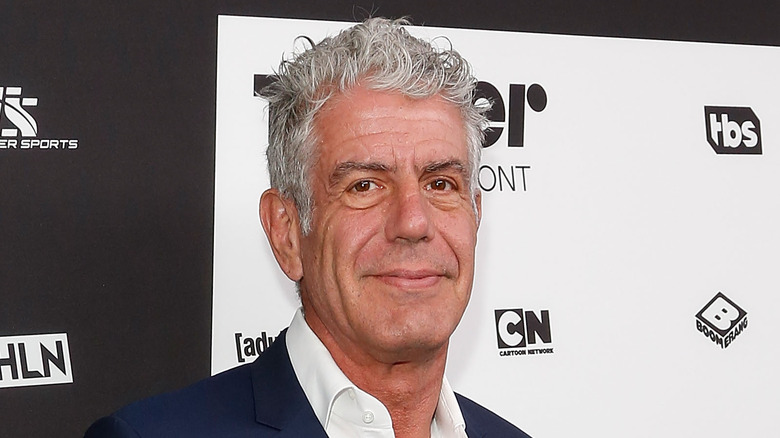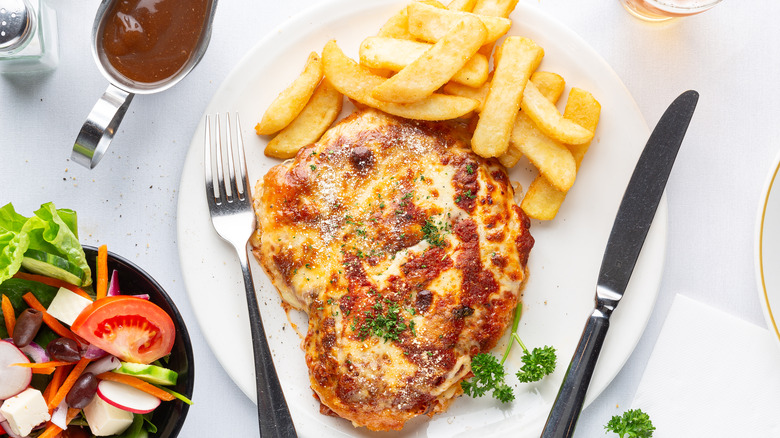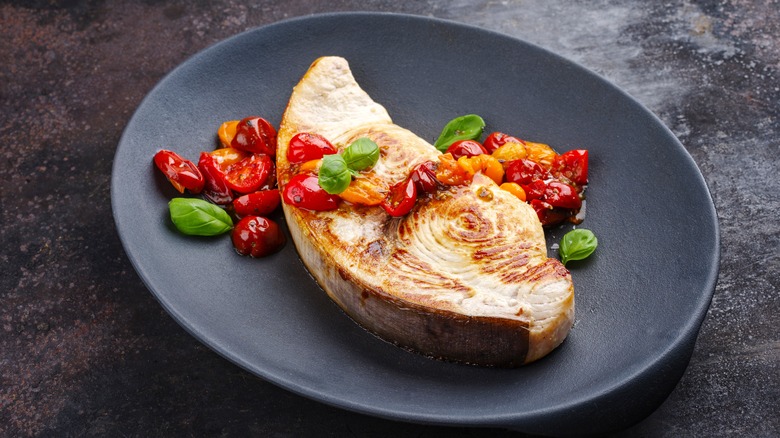Why Anthony Bourdain Recommended Pork Over Chicken At A Restaurant
We may receive a commission on purchases made from links.
Anthony Bourdain famously said he would try anything once, yet despite sampling more than a few questionable-looking dishes, what Bourdain witnessed while working in professional kitchens turned him into a bit of a whistleblower. One of his shared insights was providing deeper rationale for why professional chefs skip chicken at restaurants, and why he suggested opting for pork instead.
Bourdain's memoir, "Kitchen Confidential: Adventures in the Culinary Underbelly," uncovered the restaurant industry's many dirty secrets, including the issue with restaurant chicken. Unlike other proteins, raw chicken carries a greater risk of contracting a foodborne illness like salmonella if it's not thoroughly cooked to 165 degrees Fahrenheit (and there are less visual cues for chefs to go by to know it's done). In addition, raw chicken's harmful bacteria can easily spread to other surfaces if handled by a careless chef, contaminating ready-to-eat dishes.
In contrast, eating pork that's still pink is less risky. Per the USDA, since 1995, the chances of getting trichinosis, a nasty parasitic infection that prompted cooks to overcook pork, has pretty much disappeared. And that has freed chefs to create more tender, more flavorful pork dishes. Although it's secondary to health concerns, Bourdain also shared in an article published in The New Yorker that chicken "bores the hell out of chefs," adding that chicken is included on "menus as an option for customers who can't decide what they want to eat," and want to opt for something familiar or they feel is safe.
Why do some perceive chicken as safer than pork?
Despite Anthony Bourdain's assertion that pork is "cool," there are a few reasons why people have long believed chicken is safer, with some rationale going back centuries. From a religious or cultural viewpoint, pork is forbidden by certain groups who view pigs as "unsanitary." For Jewish individuals following a kosher diet, the ban is written in the Torah and enforced by Israeli law. Similarly, Muslims, Seventh-Day Adventists, and a majority of Indians abstain from eating pork as it's written in scriptures or for health reasons.
In addition, celebrity influence, the global impact of raising pigs, the treatment of livestock, and health concerns have fueled nonreligious objections to pork and the meat industry in general. As such, a recent survey published in The Hill found that three-fifths of U.S. households now embrace a flexitarian diet. Despite the pork industry's clever marketing and Bourdain's recommendations, those who still eat meat are more likely to choose chicken since pork is considered red meat.
While lean pork cuts are low in saturated fat and a good source of protein, essential minerals, and vitamins, red meat has been linked to an increased risk of heart disease and cancer. Chicken has similar nutritional benefits to lean pork, but white meat has less than half the calories and a sixth of the fat as pork. Although a leaner protein, fat adds flavor, which is likely why Bourdain argued that chicken is tasteless compared to pork.
More restaurant ordering advice from Anthony Bourdain
While the end of Anthony Bourdain's career was spent introducing us to new cultures through food, the tips he shared at the beginning of his career changed how we viewed more than restaurant chicken. Seafood was also a repeat offender for Bourdain since it's highly perishable. Typically, chefs receive orders on Tuesdays and Fridays, meaning the reasonably priced fish special on Monday is likely four days old. Add in poor refrigeration tactics when the restaurant is busy, and you've got a recipe for possible food poisoning. Bourdain recommended ordering fish on Tuesdays when it's likely the freshest — and, he said, always avoid discount sushi. While Bourdain later clarified that he was referring to restaurants that don't specialize in fish, he still avoided two varieties at all costs.
In his memoir, Bourdain shared why he stopped eating swordfish or ordering restaurant mussels. He pointed out that swordfish often contain parasitic worms that don't die when cooked. As for the mussels, it's essential to pick through them before cooking and discard dead ones; however, during busy shifts, Bourdain said chefs often skip that step, potentially serving customers a dish that can make them sick. His 1999 New Yorker article, "Don't Eat Before Reading This," had a lot more to say about ordering well-done beef, recycling restaurant bread, and people who brunch, but sometimes ignorance is bliss.



